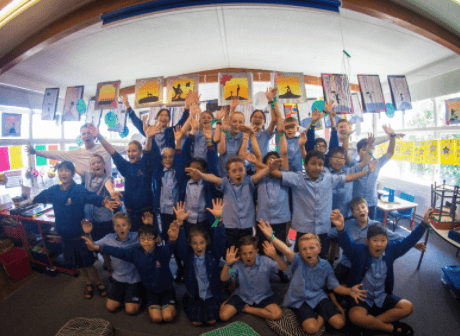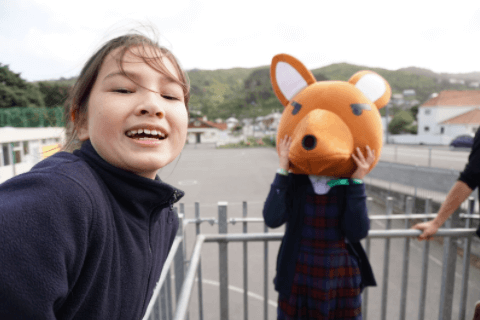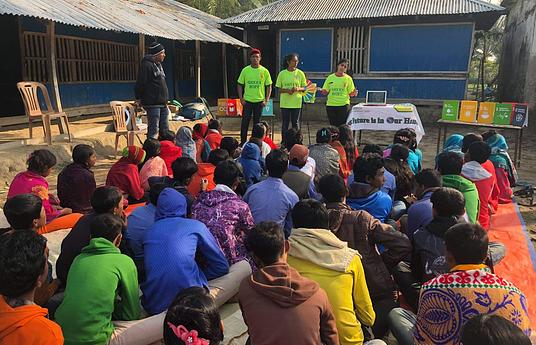Today is World Wildlife Day, the intention of this day is to celebrate forest-based livelihoods and seek to promote forest and forest wildlife management models and practices that accommodate both human well-being and the long-term conservation of forests, forest-dwelling species of wild fauna and flora, and the ecosystems they sustain and promote the value of traditional practices and knowledge that contribute to establishing a more sustainable relationship with these crucial natural systems.
To commemorate this important event, HundrED 2021 innovation, Squawk Squad has shared a reflection on the tension of the environmental crisis in New Zealand, while giving insight into the approach Squawk Squad is taking in Aotearoa-NZ - aiming to instill long-term behavioural change alongside immediate action-based solutions.
Note from the Author: I am not a trained nor practicing teacher, nor do I have a deep academic understanding of the New Zealand (NZ) schooling system, however, for 2.5+ years now I’ve been leading a small team that has developed highly popular programmes for NZ primary schools (ages 5-12years). What’s the key to our success? Passion and purpose. I will be putting in occasional Māori words (indigenous peoples of NZ), with approximate English translations in [ ].
As the world grapples with an environmental crisis we must make a conscious decision on how to best combat the ever-evolving list of seemingly overwhelming issues (climate change, biodiversity-loss, plastic pollution, deforestation….). As with all great societal challenges, there is tension between;
- Addressing the immediate symptoms of the issues, and
- Allocating effort towards creating long-term fundamental change to address the root causes of these issues (the effect of which can often take years to realise).
Unfortunately, it appears to both be in our instinctive human nature and ingrained within our Western democracies (via short-term election cycles) to prioritise short-term wins over long-term reform. This article is a reflection on this tension, while also giving insight into the approach Squawk Squad is taking to help on both fronts in Aotearoa-NZ - aiming to instill long-term behavioural change alongside immediate action-based solutions.
“I see such changes and an awareness in my students each time I teach your programme. They really focus on what they can do now and what they can do at home. It is really great to see.”- Vicki, Knighton Normal School
Inspiring a nation of kids to fall in love with nature
Squawk Squad is a digital environmental educator, based in Aotearoa-New Zealand, with a vision to inspire a nation of ‘kiwi’ kids to become environmental leaders, through education and action. We’ve reached ~50,000 kids in the past 4 years, learnt a lot, and were humbled to be recognised in 2020 as one the Top 100 Educational Initiatives Worldwide by HundrED.
As we’ve grown, our approach has continually adjusted, but the crux of our Mahi [work] is that we aim to inspire and motivate teachers/students to connect with nature by digitally providing engaging, environmentally-focused learning resources (videos/lesson plans/interactive programmes).
At Squawk Squad we believe in the old adage ‘people protect what they love’, and as we’ve grown this has played an increasingly central role within our approach. Thus before asking students to take positive environmental actions, we aim to focus on encouraging students to develop a relationship with their local environment first. Thanks, both to direct feedback from our teacher cohort, and to David Sobel’s excellent book “Beyond Ecophobia” we’ve learnt that the best way to help facilitate developing a life-long love for nature is by experiencing it first-hand.
[What creates environmentalists?] Many hours spent outdoors in a keenly remembered wild or semi-wild place in childhood or adolescence, and an adult who taught respect for nature.” David Sobel
Thanks to these learnings, our tech-enabled approach is not an end-goal in itself, but rather we simply use technology as the tool to scale our impact. Thus, we aim to empower teachers to teach their students in-person about their local environment by providing them with adaptable, relevant lesson plans no matter where they are based within Aotearoa-NZ.
Once students begin to love their local nature, we can then encourage them to think about how they can make a difference to their local environment - ‘protecting what they love’. This results in participating classrooms taking small positive actions locally - i.e. planting trees, beach clean-ups, growing kai [food], and more. Significantly, through our interactive and live programmes, we then publicly share participating classroom efforts - this results in students gaining a sense of purpose by contributing to something, ‘bigger than themselves’ - joining 1000’s of other kiwi kids around the country to collectively make a big difference.
“[It is a] Great opportunity for the children to see so many other kids around the country also participating.” Donna H, Homeschool
What are we prioritising as a society?
Here in Aotearoa-NZ, we are outwardly considered environmentally-conscious, yet we are one of the highest polluters per-capita in Western societies. Each year we allocate $100Ms to fixing environmental issues ‘post-event’ (i.e. toxic waste clean-ups), and yet proportionally very little goes towards addressing the root causes of these very same issues - our shared societal values.
Our schools are where our values are most obviously shaped - young minds eager to learn and grow. If we really desire to create fundamental change, then we need to be re-prioritising the values that we transfer to our children. If we want a future society that holistically values the environment, it would make sense for this to be prioritised within our schooling system (and massively so, given our current knowledge of the environmental challenges we face worldwide). However, in NZ, it seems to be near impossible to gain significant funding to put towards environmental education. Squawk Squad has been recognised in the Top 100 Educational Initiatives Worldwide and has had much success, and yet we are constantly underfunded. This has stretched us to the point of breaking and has had a tangibly significant detrimental impact on the potential of our kaupapa [vision and purpose].
We need to re-think what we prioritise - more resource needs to be given to addressing ‘upstream causes’ (education) - this is the best (perhaps only) way to achieve lasting, meaningful social change. If we invested more in environmental education, we could prevent environmental disasters before they eventuated, because concerned citizens would foresee and prevent disasters before they ever happened.

As the late Sir Ken Robinson’s famous TedTalk emphasised - most public schooling systems worldwide evolved during the era of industrialization. This has resulted in the emphasis being on preparing students to gain ‘real-world’, practical skills in preparation specifically for paid-work. Unless we challenge this norm, we will continue to follow the ‘business-as-usual’ path which has got us into this environmental crisis in the first place. There’s so much in life that doesn’t have an economic value to it and yet is nonetheless highly valuable (a pristine environment, stay-at-home parenting, the value of a smile), it’s time that our educational system focused on all things of value, not just selectively emphasising some.
If Western schooling has evolved from industrialism (dominance, extraction), let’s look to indigenous cultures that have increased connection to a more holistic approach to environmental education (and education in general). This is a journey that we’re excited to be following with Squawk Squad, and although we have a long way to go we’re already understanding the relevance and leadership that Te Ao Māori [Māori world view] can provide.
The other good news is that teachers are ready to lead the change, they just need to be given agency. We’ve been overwhelmed by the energy within our amazing teacher cohort who are eager to teach about the things they know are most important for our tamariki [kids]
"Never doubt that a small group of thoughtful, committed citizens can change the world; indeed, it's the only thing that ever has.” Margaret Mead
We are not the whole answer, just a small piece of it - our efforts add to 1000’s of other organisations and individuals who are all doing their part towards making a collective difference within environmental education both here in Aotearoa-NZ, and world-wide. Knowing that gives us hope and this is the same approach that we emphasise within our programmes - each student/school does a small amount locally, to add to a big impact collectively. Collective action around shared goals and values in the only way to address the 21st century's greatest challenges, and we look forward to tackling them together.
If you are interested in supporting the work of Squawk Squad, visit their website to find out more about ways to get involved.









